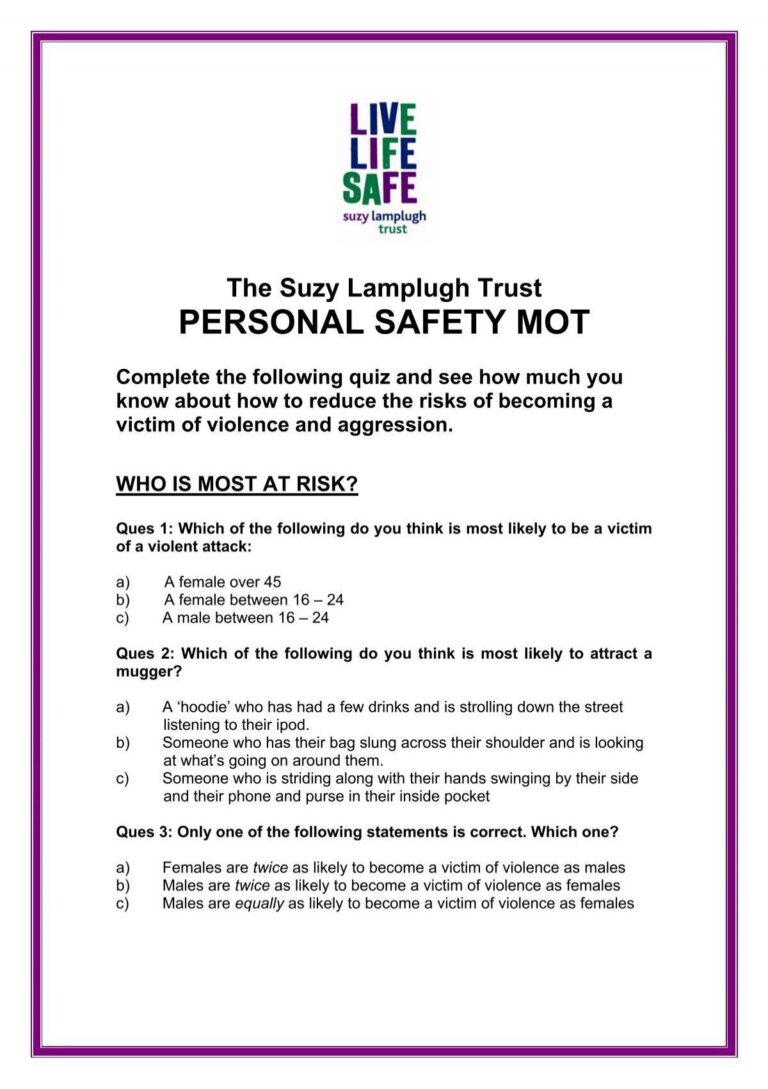Table of Contents
- Understanding the Role of Intuition in Personal Safety
- Building Trust in Your Instincts to Make Confident Decisions
- Practical Strategies for Sharpening Your Intuitive Awareness
- Integrating Trust and Intuition into Daily Safety Practices
- Final Thoughts
Understanding the Role of Intuition in Personal Safety
Our intuition often functions as an internal safety radar, constantly scanning for subtle signals that might otherwise escape our conscious attention. This innate sense manifests as gut feelings or sudden insights, steering us away from potentially dangerous situations before any overt threat becomes apparent. Recognizing and honoring these instincts can be a powerful form of self-protection, enabling us to make quick, informed decisions even when rational analysis is limited by time or information. In fact, many personal safety experts emphasize that intuition, when combined with awareness, forms the first line of defense against unforeseen risks.
To cultivate and reinforce this vital internal compass, it’s important to:
- Pause and listen: Give yourself permission to slow down and acknowledge those fleeting feelings of discomfort or unease.
- Build situational awareness: Stay alert to your environment by observing people’s behaviors, exits, and potential hazards.
- Reflect on past experiences: Learning from previous encounters sharpens your ability to detect red flags in new contexts.
- Trust your judgments: Even if your hunches cannot be immediately explained, honoring them can prevent harmful outcomes.
Building Trust in Your Instincts to Make Confident Decisions
Developing confidence in your instincts is a gradual process that begins with paying close attention to the subtle signals your body and mind send when something feels off. These intuitive nudges often serve as early warning signs, enabling you to take precautionary steps before a situation escalates. To nurture this internal compass, practice mindfulness and self-awareness daily-notice how your emotions shift in unfamiliar environments or around new people. Over time, you’ll recognize patterns and build a solid foundation of trust in your gut feelings.
To further empower your decision-making, consider adopting these techniques:
- Reflect on past experiences: Analyze instances where following your intuition led to safety or positive outcomes.
- Validate feelings through small tests: Practice acting on minor instincts in controlled scenarios to see how they unfold.
- Seek balance with reason: Let your intuition guide you, but also weigh objective information to make well-rounded choices.
By actively engaging with and trusting your instincts, you enhance your ability to respond swiftly and confidently to potential dangers, creating a powerful safeguard for your personal safety.
Practical Strategies for Sharpening Your Intuitive Awareness
Developing your intuitive awareness begins with mindful observation of your surroundings and inner feelings. Dedicate a few minutes each day to quiet reflection or meditation, allowing your mind to settle and become more attuned to subtle signals. Pay close attention not only to external cues but also to your gut reactions-those spontaneous feelings that arise without logical explanation. Journaling these experiences can help identify patterns and deepen your understanding of when your intuition is guiding you towards safety or caution.
Incorporating regular practices that heighten your sensory perception can also sharpen intuitive skills. Engage in activities like nature walks, sensory deprivation exercises, or focused breathing techniques to enhance your connection to present moments. Additionally, trust your initial impressions by creating a mental checklist of moments when intuition proved accurate. Over time, this reinforces confidence in your instinctive responses and improves your ability to promptly assess potential risks, empowering you to act decisively in situations that impact your personal safety.
- Practice daily mindfulness or meditation.
- Maintain an intuition journal to track feelings and outcomes.
- Engage in sensory-enhancing exercises regularly.
- Reflect on past experiences to build trust in your instincts.
Integrating Trust and Intuition into Daily Safety Practices
Incorporating trust and intuition into everyday safety routines empowers individuals to become proactive guardians of their own well-being. Trusting your instincts often means recognizing subtle environmental cues that might otherwise go unnoticed. This internal alert system can activate a critical early response, allowing you to avoid potential harm before a situation escalates. In practice, this means listening carefully to how your body reacts to unfamiliar people or places, and giving yourself permission to act on these feelings without second-guessing.
To effectively weave this intuitive wisdom into daily habits, consider cultivating these key practices:
- Pause and assess: Take a moment to tune into your surroundings and your feelings, especially in unfamiliar settings.
- Educate yourself: Learn about common safety signals and how intuition can serve as an early warning system.
- Communicate boundaries clearly: Trust helps you assert yourself confidently, preventing vulnerable situations.
- Practice scenario visualization: Mentally rehearsing responses sharpens your intuitive decision-making during real events.
Final Thoughts
In the end, cultivating trust in ourselves and honing our intuition are indispensable steps toward enhancing personal safety. These inner guides act as early warning systems, helping us navigate complex situations with greater confidence and clarity. By paying attention to our instincts and learning to discern when something feels off, we empower ourselves to take proactive measures that protect our well-being. Remember, personal safety isn’t just about external precautions-it’s equally about trusting the quiet wisdom within. Embrace that trust, listen closely to your intuition, and make it a cornerstone of how you approach your daily life. Your safety depends on it.Check Our Other Blogs
- StunGun – Your Trusted Source for Stun Guns, Laws, and Self-Defense Tips
- PepperSprayLaws – Your Trusted Resource for Pepper Spray Information
- StunGunLaws – Your Trusted Guide to Stun Gun Legality and Safety



